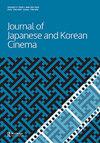下载PDF
{"title":"Parameters of disavowal: colonial representation in South Korean cinema","authors":"Ji-yoon An","doi":"10.1080/17564905.2018.1518300","DOIUrl":null,"url":null,"abstract":"Author(s): An, J | Abstract: © 2018 by Jinsoo An. A free ebook version of this title is available through Luminos, University of California Press’s Open Access publishing program. Visit www.luminosoa.org to learn more. The colonial experience of the early twentieth century shaped Korea’s culture and identity, leaving a troubling past that was subtly reconstructed in South Korean postcolonial cinema. Relating postcolonial discourses to a reading of Manchurian action films, kisaeng and gangster films, and revenge horror films, Parameters of Disavowal shows how filmmakers reworked, recontextualized, and erased ideas and symbols of colonial power. In particular, Jinsoo An examines how South Korean films privileged certain sites, such as the kisaeng house and the Manchurian frontier, generating unique meanings that challenged the domination of the colonial power, and how horror films indirectly explored both the continuing trauma of colonial violence and lingering emotional ties to the colonial order. Espousing the ideology of nationalism while responding to a new Cold War order that positioned Japan and South Korea as political and economic allies, postcolonial cinema formulated distinctive ways of seeing and imagining the colonial past.","PeriodicalId":37898,"journal":{"name":"Journal of Japanese and Korean Cinema","volume":"10 1","pages":"184 - 187"},"PeriodicalIF":0.0000,"publicationDate":"2018-06-08","publicationTypes":"Journal Article","fieldsOfStudy":null,"isOpenAccess":false,"openAccessPdf":"https://sci-hub-pdf.com/10.1080/17564905.2018.1518300","citationCount":"0","resultStr":null,"platform":"Semanticscholar","paperid":null,"PeriodicalName":"Journal of Japanese and Korean Cinema","FirstCategoryId":"1085","ListUrlMain":"https://doi.org/10.1080/17564905.2018.1518300","RegionNum":0,"RegionCategory":null,"ArticlePicture":[],"TitleCN":null,"AbstractTextCN":null,"PMCID":null,"EPubDate":"","PubModel":"","JCR":"","JCRName":"","Score":null,"Total":0}
引用次数: 0
引用
批量引用
否定的参数:韩国电影中的殖民表现
作者:An,J|摘要:©2018作者:Jinsoo An。该标题的免费电子书版本可通过加州大学出版社的开放获取出版计划Luminos获得。访问www.luminosoa.org了解更多信息。20世纪初的殖民经历塑造了韩国的文化和身份,留下了一段令人不安的过去,在韩国后殖民电影中被巧妙地重建。《否认的参数》将后殖民话语与对满洲动作片、基桑和黑帮电影以及复仇恐怖电影的解读联系起来,展示了电影制作人如何重塑、重新文本化和抹去殖民权力的思想和象征。金秀安特别探讨了韩国电影如何在某些地点享有特权,如基桑宫和满洲边疆,产生了挑战殖民大国统治的独特意义,以及恐怖电影如何间接探索殖民暴力的持续创伤和与殖民秩序挥之不去的情感联系。后殖民电影追求民族主义意识形态,同时回应将日本和韩国定位为政治和经济盟友的新冷战秩序,形成了看待和想象殖民历史的独特方式。
本文章由计算机程序翻译,如有差异,请以英文原文为准。


